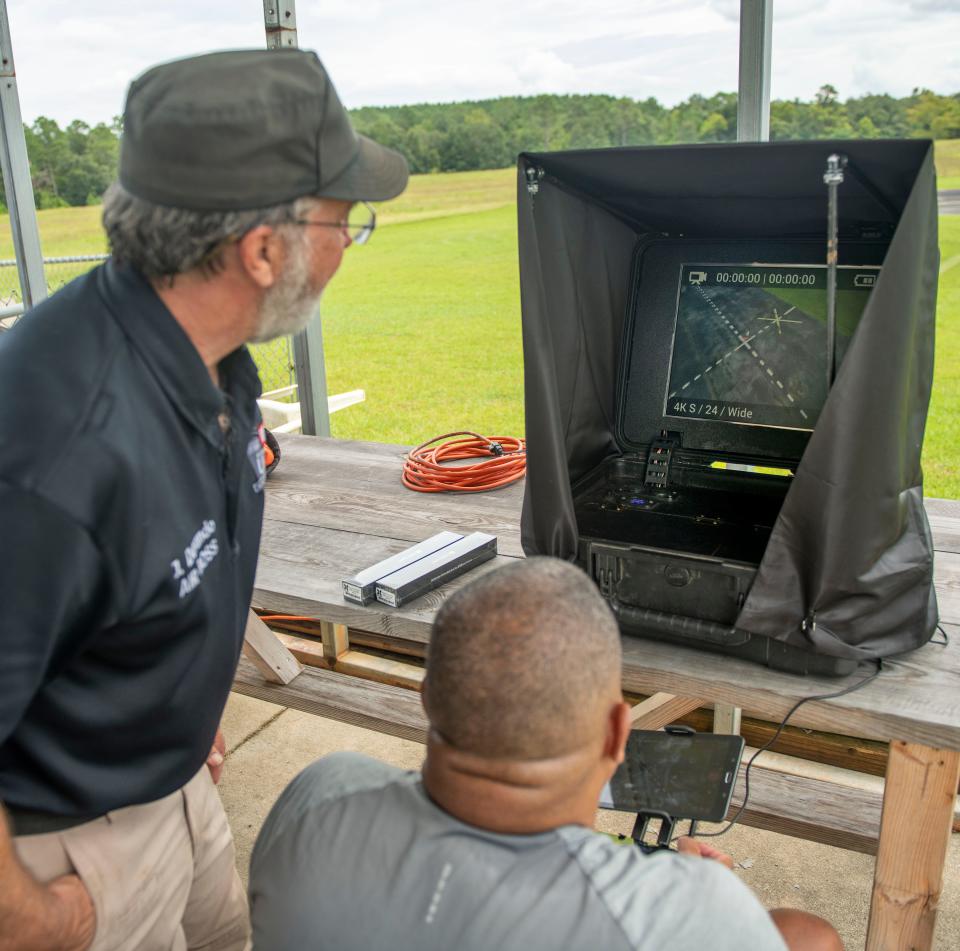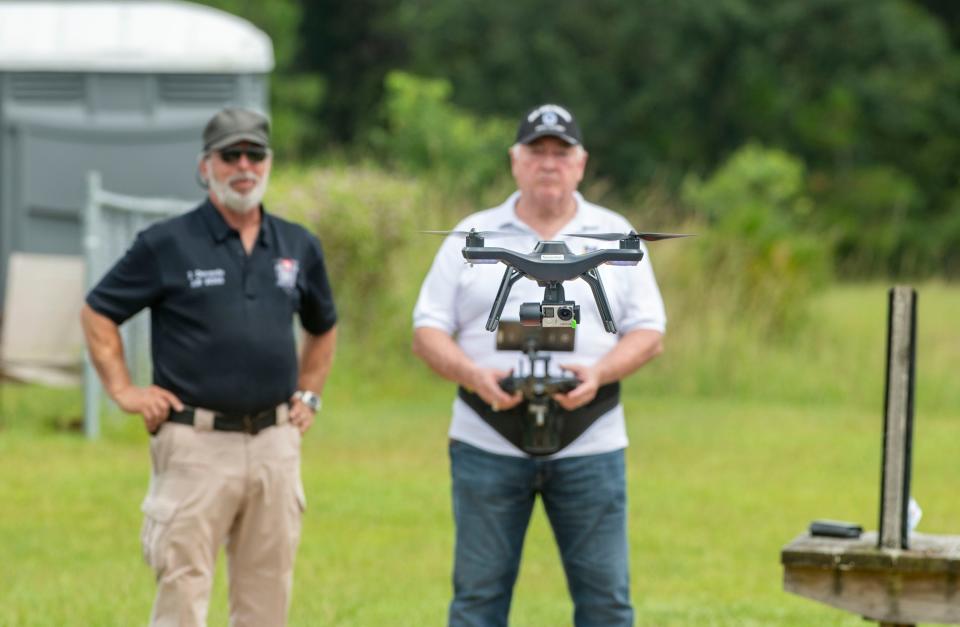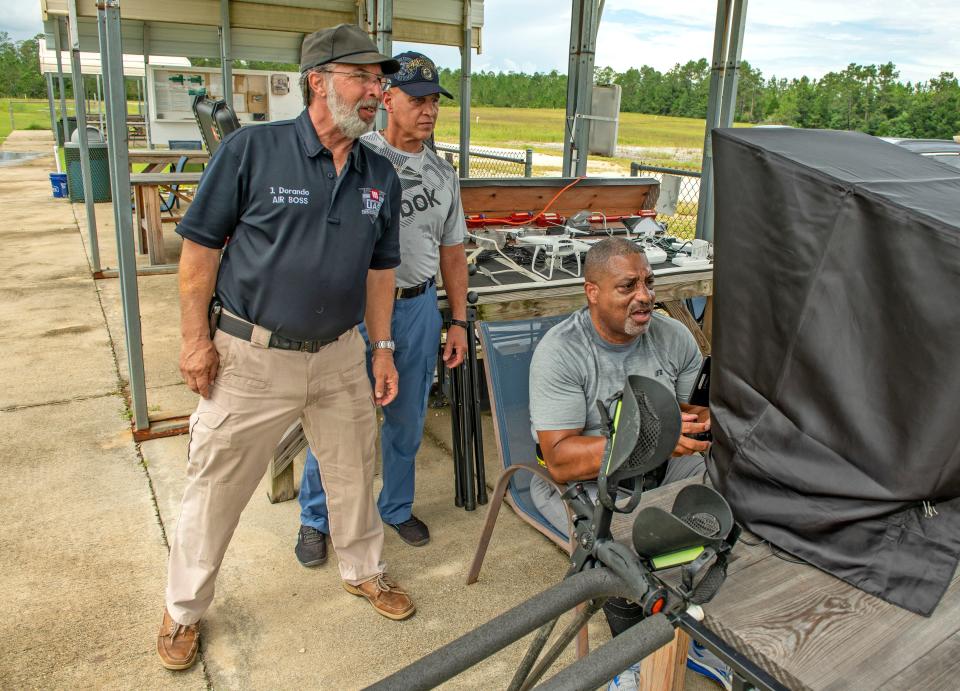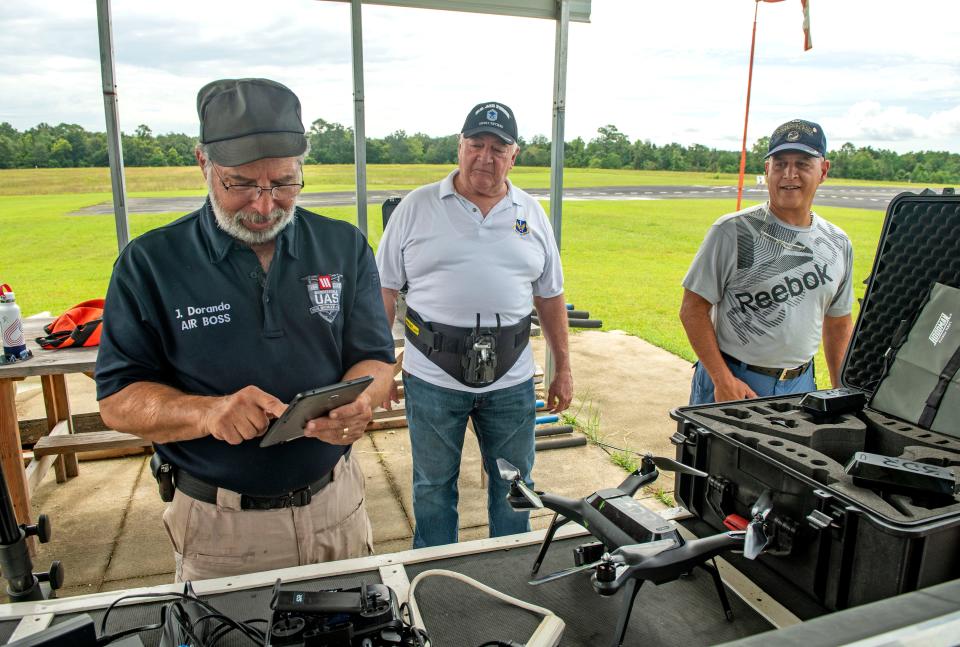Pensacola program teaches veterans to fly and repair drones for fun and to find jobs
Last July, Terry Wallace was introduced to drone technology by his nephew, who uses drones to take aerial photos for his real estate company.
Wallace, an Army veteran, didn't think about the technology much until it was introduced to him again a few months later.
A salesperson, Karynn Dorando, was helping Wallace find furniture when they struck up a conversation. She suggested Wallace might be interested in a program her husband, Joseph, operates to help veterans get into the commercial drone industry.

Looking back at the meeting now, Wallace said it was meant to be.
"I can't go places that I used to go," said Wallace, who uses a wheelchair. "I used to fly, so now I'm back in the air again having fun with a smile on my face. And obviously that's therapeutic right there, where you can find something that brings you joy. Because when you're living with constant pain or injury that you're going to have for life, it's nice to have that escape."
Wounded Eagle UAS helps wounded and disabled service members and veterans find pathways into the commercial drone industry through training, networking and mentorship. Participants can learn to operate and repair drones, as well as earn a free Federal Aviation Administration or commercial drone driver's license, which can lead to jobs earning up to $120,000 a year.
Related: 10 years in the making, Monument to Women Veterans is a step closer to reality
In case you missed it: Permanent restrooms at Veterans Memorial Park could happen after DeSantis vetoes bill
Joseph Dorando established the program in 2014 in El Monte, California, while he worked as civilian information technology specialist at the El Monte Police Department. He had been using drones since 2012 to help spot tuna during his fishing excursions.
He suggested using drones in the police department to help with things like traffic investigations, perimeter sweeps and search efforts, but was brushed off.

Eventually, it dawned on Dorando, a Navy veteran, that people would need to fly and repair these drones. He also knew many veterans were trying to find jobs, and realized it would be a great idea to combine the two.
When Dorando was preparing to leave California, he searched for a city where people cared about veterans. He decided Pensacola would be the perfect fit and arrived here last year.
Now, he hopes to spread his services to veterans in the area. Locally, the program partners with Monument to Women Veterans, a nonprofit that honors the contributions women have made to the military and provides resources and assistance to all veterans.
Describing the benefits of drone piloting, Dorando said, "You're developing eye-hand control and this also helps muscle training, muscle memory, that kind of stuff. But it just does wonders for people with (post-traumatic stress disorder) or (traumatic brain injury). Most of my guys have PTSD and when they fly (first-person view), it just takes them into another world. They can just focus on this and nothing else, because you can't take your focus off of it. The moment you take your attention off of flying, you crash."
With a laugh, he noted, "The hard part is trying to keep a straight face and look stoic as you're flying and having a blast, doing all these aerobatic maneuvers."

Drone technology has an array of applications, from the commercial to the humanitarian. Drones can be used to inspection power lines and cell towers, to survey land damaged by natural disasters or even to drop off a life preserver to an endangered swimmer.
Along with piloting skills, the Wounded Eagle UAS program teaches participants about the importance of privacy rights, risk management and how to build a drone. It also offers courses to learn about software such as DroneDeploy, a mapping tool used in many industries. There is also a push to get participants connected to the Civil Air Patrol, which conducts emergency services and disaster relief missions nationwide.
Pat Rushing is a Navy veteran who has always loved the idea of flying. When he was kid, he was fond of airplanes, jets and rockets. The 71-year-old wanted to join the Air Force but ended up in the Navy.
After enlisting and serving in Iraq and Afghanistan, Rushing was diagnosed with PTSD. While leaving therapy at the Pensacola Vet Center, he saw a flyer for Wounded Eagle UAS and got in contact with Dorando.

Rushing's wife had bought him a drone for his birthday, so he was used to the technology. But with Dorando, he was able to learn how to use smaller drones, which has helped with his hand-eye coordination and helped him feel more relaxed with his PTSD.
"Drones are a way, without having to buy a big airplane, for you to fly your own airplane. It's kind of a way for us to relive our dreams, shall we say," Rushing said. "And I just enjoy the fact of going somewhere and being able to see something you can't normally see."
The possibilities and benefits of drone technology are endless, but even for Dorando, who has worked with drones over a decade, there is still a simple joy in playing with his remote control toy.
"It gives me the opportunity to enjoy my second childhood without parental supervision," Dorando said jokingly. "Flying a drone all day and teaching people to fly drones and doing FPV and all the stunts and everything. Yeah, it's hard to keep a straight face. It's just so much fun."
To learn more about the program, contact Joseph Dorando at joe.dorando@weuas.org, call 626-807-0428 or visit weuas.org.
This article originally appeared on Pensacola News Journal: Wounded Eagle UAS in Pensacola trains veterans on drone technology

